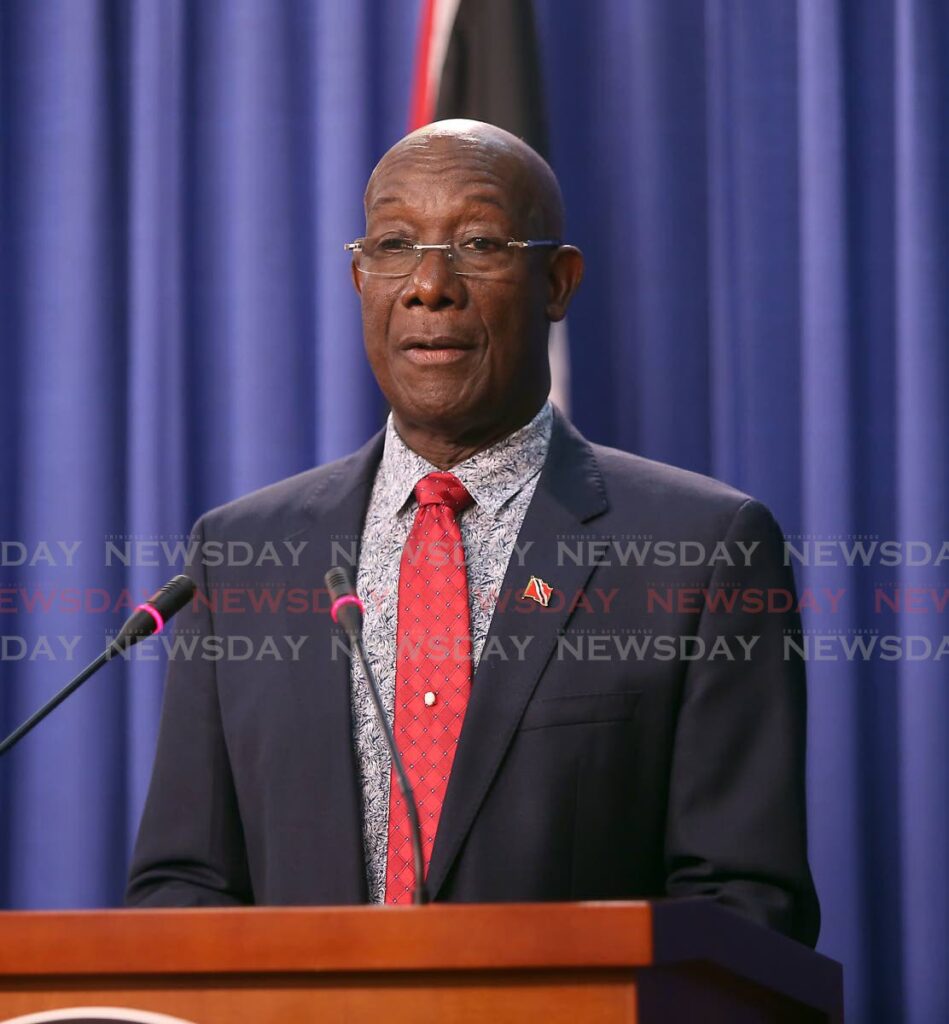PM: Caribbean blessed with renewable energy, but costs too high

The Prime Minister has said the region is “blessed with a high abundance of renewable energy.”
He was speaking at the opening of the international energy conference and expo, Harnessing Energy for Development, in Guyana on Tuesday.
He said, “It is estimated that the Caribbean holds approximately 3,000 megawatts (MW) of potential solar energy, 800 MW of potential wind energy, and over 3,000 MW of potential geothermal energy. With the appropriate investment the region can substantially reduce its dependence on imported refined energy products by harnessing the natural power generated by solar, wind, geothermal and hydroelectric sources.
"Even so, complete or significant substitution for hydrocarbon products is a long way off.”
He said though there is an accelerated renewable energy transition owing to climate change, it is slow-paced in the Caribbean.
“In an October 2022 release, the president of the Caribbean Development Bank reported that to meet the region’s target of 47 per cent of renewable energy by 2027, or 55 per cent of renewable energy by 2030, would mean installing 320 MW of renewable energy capacity per year, compared with the average of 25 MW per year installed over the last nine years across the region.”
Dr Rowley said this hasn’t been achieved because of the high prices of the infrastructure needed to roll out these “national green energy programmes.” He said these high costs have even made it “prohibitive” for most countries in the region.
In addition, he said, “The verbal encouragement, even aggressive demands of the wealthy countries, have not been accompanied by any requisite care and investment in our small debt-laden and struggling economies.”
While industrialisation delivers jobs and products that raise the standard of living, he said it requires “base load power that renewables cannot immediately provide.
“To address energy security and resource-shortage concerns, we need to have an energy mix that capitalises on domestically/regionally available and economically viable sources.”
Focusing on crude oil, he said, “There is a huge interest by major oil and gas companies prospecting off the coasts of Barbados, Grenada, Bahamas, Cuba, Jamaica and the Dominican Republic. Exploration success by new Caribbean entrants in the petroleum industry can be a game-changer for the Caribbean region.”
He added that oil and gas will remain the dominant energy source in the near to medium term, with regional availability and infrastructure needed to determine how various countries expand their domestic energy supplies.
But, he said, “Industry innovation for both fossil fuels and renewable sources will continue to increase energy supply and energy efficiency, thereby improving energy security and reducing greenhouse gas emissions.”
Hence, Rowley said, the concept of climate change should not prevent developing countries from using oil and gas as sources of energy to grow their economies. He said oil and gas are still the main source of energy for “the world’s economic engine” and are cost-effective.
“It is interesting to note that during the rethink, in so far as circumstances demand, some developed countries have fired up their old coal burning plants and have declared hitherto despised nuclear power as 'clean energy.'
"The Caribbean response is to designate natural gas as the clean energy, reserve our right and willingness to continue to explore for and market oil resources and invest in green energy and technologies as far as we are able to.
But, he added, "We will continue to make the case to the major global polluters to encourage investment in green initiatives identified within the region. We in the Caribbean are not alone in defending our energy interests as I have consistently done.”
He said the regional energy landscape “does not equip any single country to meet the energy security requirements of the region.” Rowley said because of this Trinidad and Tobago has decided to engage with other countries in the region to develop economic co-operation in the sector.
Hence TT has agreements with Venezuela, Barbados and Grenada to allow "the exploration of hydrocarbon resources in the maritime boundaries shared with our neighbours."TT also has memoranda of understanding with Guyana and Haiti on co-operation in the field of energy.
He said the government has also executed a heads of agreement with Venezuela for the development of the Dragon Field to facilitate the sale of natural gas to the domestic market and the LNG facility in TT.
However, he pointed out, “The progress in the development of the Dragon Field was disrupted and delayed by US sanctions against Venezuela. Following the request by the government of TT, the US Treasury Department recently granted the government an initial two-year US Office of Foreign Assets Control licence to develop the Dragon Field with a view to enhancing Caribbean energy security.”
The US$1 billion deal was signed between TT and Venezuela in August 2018. Those involved included energy giant Shell, Venezuela’s state oil company PDVSA, and TT’s National Gas Company (NGC).
The Dragon deal was estimated to produce approximately 150 million standard cubic feet of gas a day, which was supposed to be imported through a billion-dollar pipeline to the Hibiscus platform, off the northwest coast of TT. The platform is jointly owned by the TT government, NGC and Shell, but the deal was left in limbo after the US imposed sanctions on Venezuela in 2019.
Nevertheless, Rowley said the proposed Dragon oroject with Venezuela ws an example of "government-to-government co-operation in the monetising of natural gas resources." Additionally, he said TT was open to discussion with its other Caribbean neighbours on monetising their hydrocarbon resources in TT.
"We would also wish to assist you in developing programmes to meet the necessary training needs of your energy personnel," he offered, reminding his audience: "TT possesses a number of non-governmental and government agencies that have been meeting the human-resource-development needs of the energy and industrial sectors of TT as well as emerging oil and gas economies.”

Comments
"PM: Caribbean blessed with renewable energy, but costs too high"